Feb 15, 2025 – Arrival in Korea from Delhi, India
Hello. Today, Sunim is returning to Korea after completing a 54-day visit to Bhutan and India.

Sunim departed from Delhi Airport at 8 p.m. yesterday and arrived at Incheon Airport early this morning after traveling through the night. He managed to get some sleep sitting up on the plane.

After leaving Incheon Airport, Sunim headed to the Seoul Jungto Center.

As Sunim got out of the car, members of the Jungto Society lay Sangha lined up on both sides to warmly welcome him.
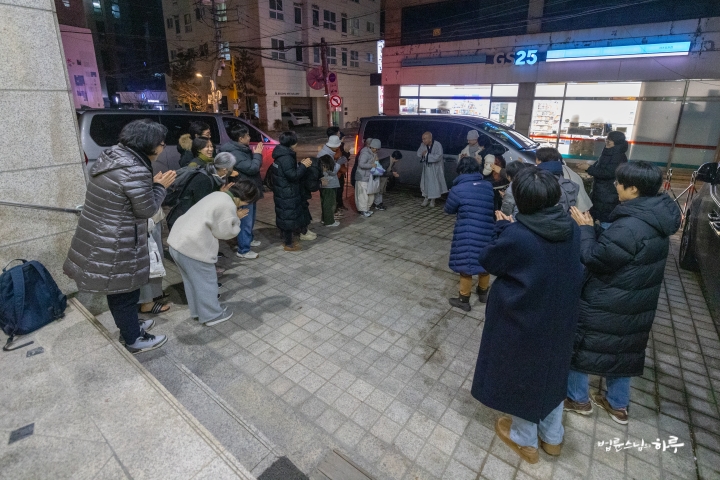
“Welcome back, Sunim!”
As the crowd cheered, Sunim smiled and said:
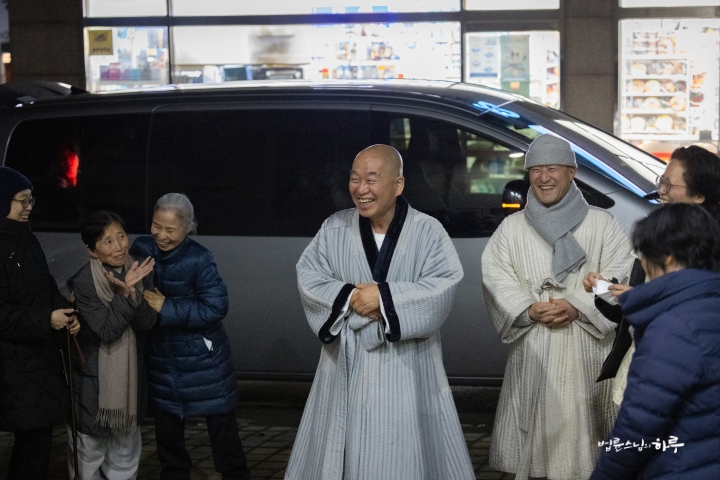
“Why are you suddenly doing things you don’t usually do?”
“We’re just so happy to see you back in Korea after such a long time.”
After greeting the members, Sunim first paid respects at the Dharma hall.
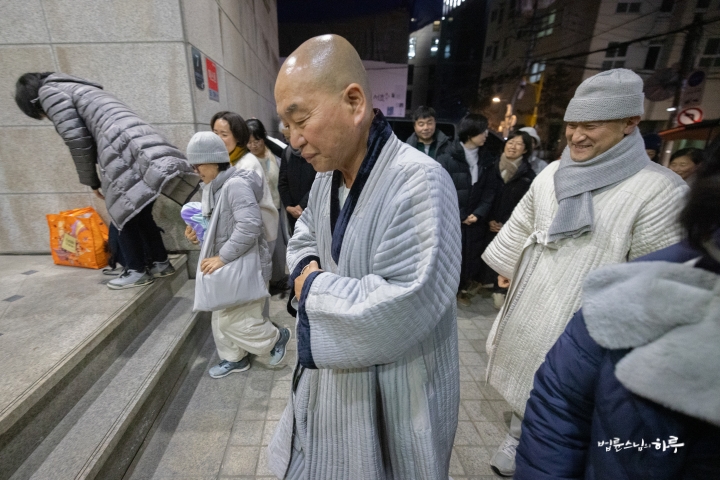
Then, the members bowed three times to Sunim. Sunim also bowed three times to the members in return.
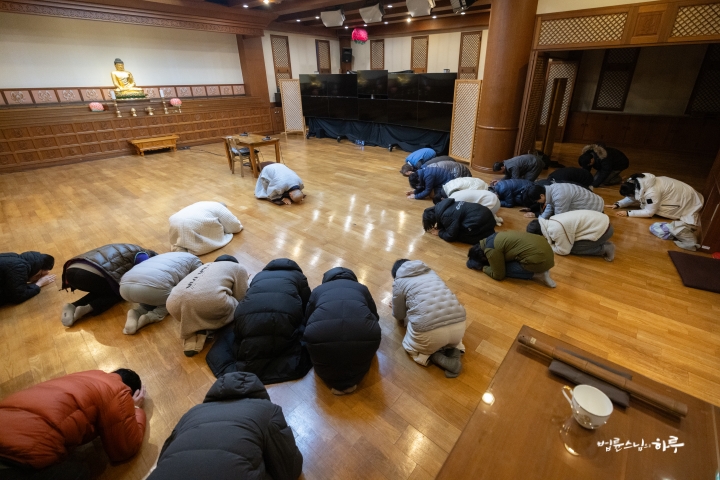
“I have returned safely.”
When the members requested a few words, Sunim briefly shared his impressions from visiting Bhutan and India.
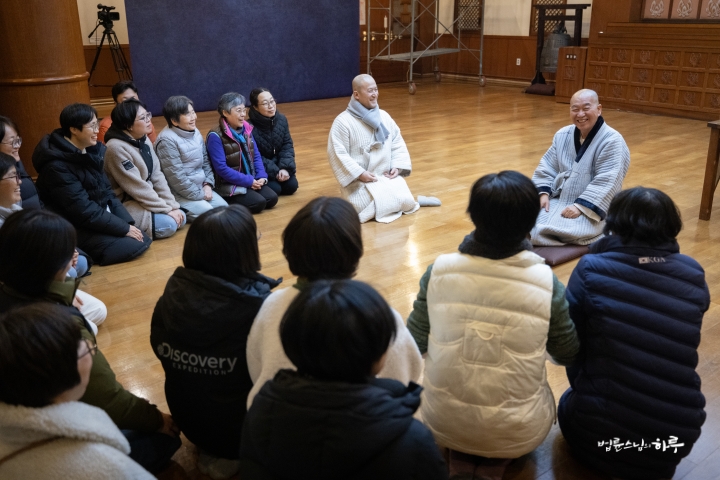
“I was feeling unwell and barely managed to get through the trip. That’s why my voice is not coming out well now. I feel like my mental acuity has diminished and things are a bit hazy. (Laughs)”
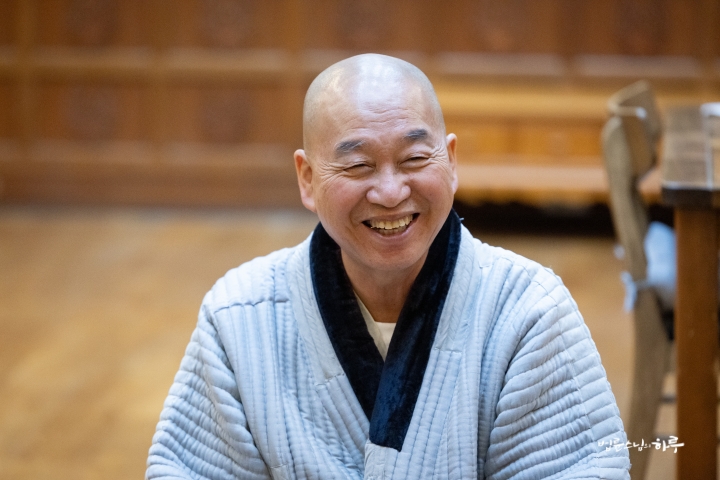
To Start Sustainable Development in 200 Villages
“Through this survey of Bhutan, we’ve roughly grasped the scale, but implementing the project going forward is the biggest task. Currently, we have one staff member working in Bhutan, but to properly carry out the project, we’ll need at least 10 staff members. This is because we need to develop two entire districts, Trongsa and Zhemgang. There are 250 houses that need to be newly built, and about 1,000 houses that need repairs. We need to visit each house to check its condition, determine if it just needs shelves, a kitchen, complete replacement of pillars, or needs to be rebuilt entirely. We have to survey all of this and then set a budget, so there’s an enormous amount of work. Even if we have the residents build and repair the houses themselves, JTS needs to provide samples. This is because the residents don’t know how to repair houses. We need to create sample kitchens to show them what they should look like so that residents can follow the example. Currently, there are 65 chiwogs that need development, and each chiwog usually has 3 to 4 villages, so we need to develop almost 200 villages. We need to create a sample of a repaired house in each of these 200 villages, so that the villagers can see and follow it.
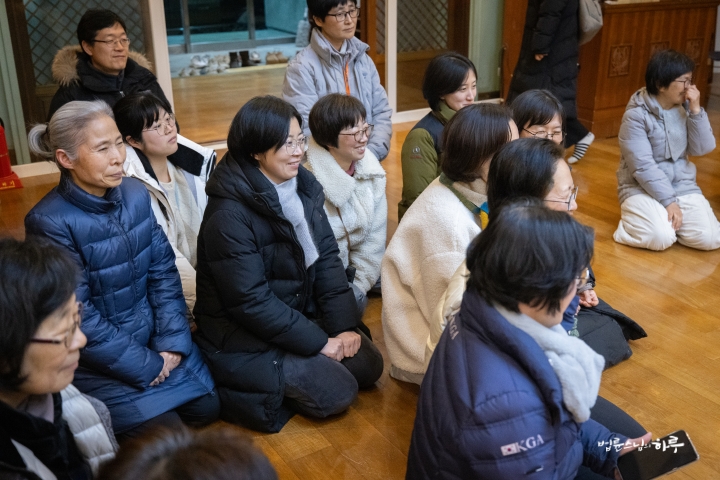
First, we need to conduct preliminary surveys, then directly confirm and approve through site visits, set a budget, and review if the budget is appropriate. After the review, we need to purchase and deliver materials. For this, volunteers first need to create samples so that residents can see them and repair their houses accordingly. However, most houses don’t have tools, so we need to provide tools as well. So it seems the initial phase of the project will be the most difficult, but once it gets started, the residents will gradually learn and be able to follow.
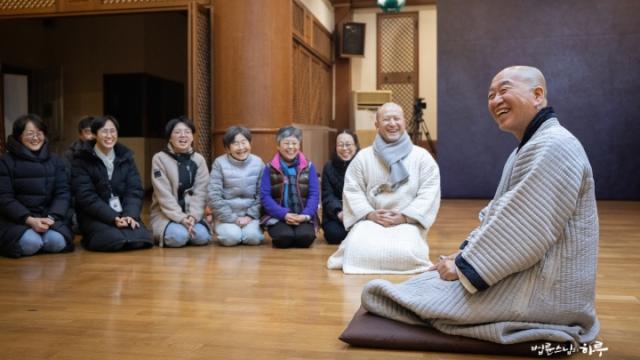
Therefore, we need to prioritize the sustainable development project in Bhutan right now. We should immediately send two more staff members from among you to the field, or provide support from Korea. The most needed personnel on site right now are carpenters. We also need people who can handle design, interior work, and repairs.
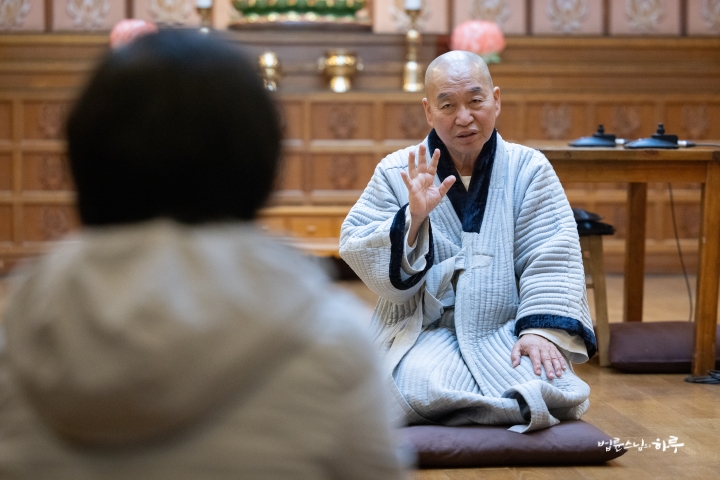
Growing Demand for Buddhism in India
We also successfully completed the pilgrimage to sacred sites in India. As the Indian economy improves, the road conditions for travel have greatly improved, and overall situations have changed significantly. This time, I gave a Dharma talk at an assembly of 50,000 people from the Maurya clan, who claim to be descendants of King Ashoka. The Maurya clan was even larger in scale than the Shakya clan. I also gave lectures at Jindal University and NIT in Delhi, and the atmosphere in Delhi was similar to Korea’s modernization process in the 1980s. Indian college students were also watching a lot of YouTube, and like Korean youth, they were experiencing many mental conflicts. In the process of transitioning from extended family systems to nuclear family systems, young people were feeling burdened by family and experiencing a lot of mental confusion. With India’s population of 1.4 billion, the demand for Buddhism to heal this mental confusion is likely to grow increasingly. So I thought we need to prioritize quickly producing and distributing books that summarize the Buddha’s teachings and life story to the Indian people. We can discuss the rest later when we have a chance to sit down together.”
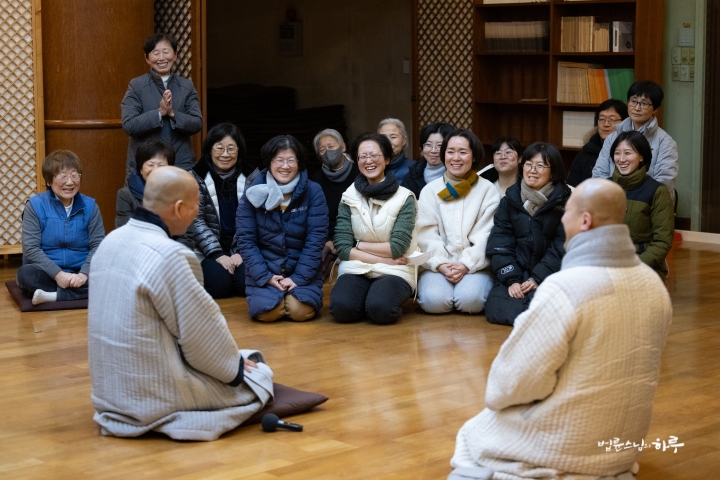
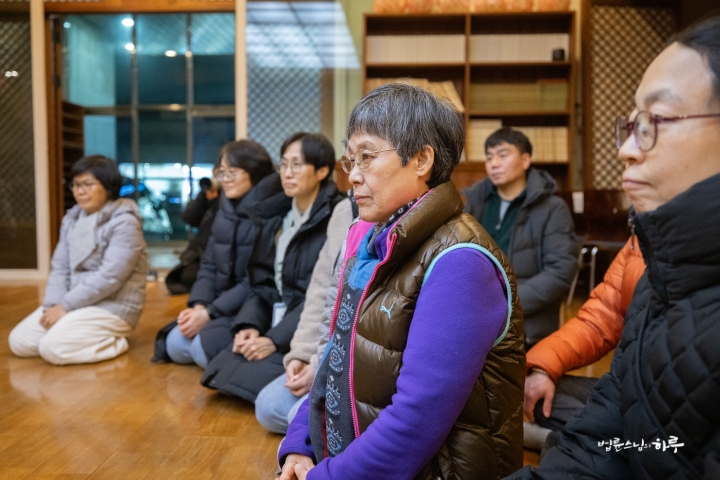
Sunim wanted to share more stories but was too tired, so he promised to continue another time.
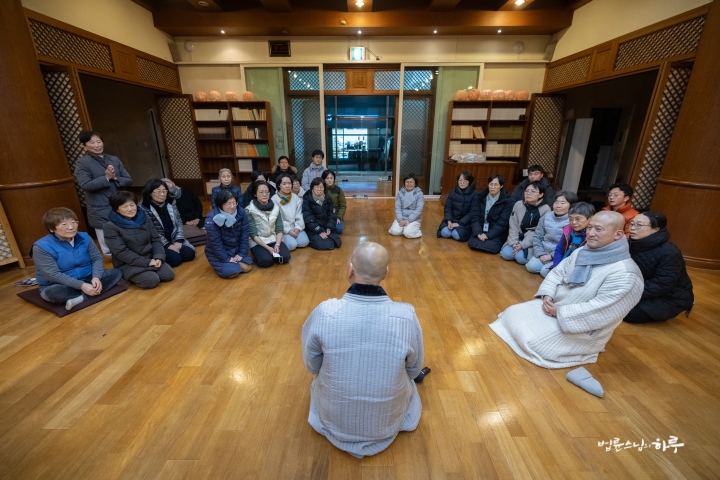
After resting and recovering from the journey, he concluded today’s schedule.
Since there was no Dharma talk today, we’ll end this post by sharing a conversation between Sunim and a questioner from last Friday’s live Dharma Q&A broadcast.
My Mother Hates My Father, What Should I Do in the Middle?
“You’re thinking about this too much. From your perspective, it might seem like your parents are fighting and living like enemies, but there must be good aspects too, which is why they’ve lived together for so long. If there were only bad aspects, they couldn’t live like that. So it’s best to just listen to your mother’s words without taking them too seriously. Just say things like, ‘Oh, is that so?’ or ‘It must have been hard for you because of Dad.’
It’s not helpful to hate your father just from listening to your mother’s side, like when you were young, or to call your father and tell him not to torment your mother. That’s their problem, not yours. Your mother is struggling, so she can’t help but confide in her daughter, whom she’s been confiding in since childhood. You should just listen; it’s not right to demand ‘Don’t say such things.’ You think, ‘If I can’t solve it, it’s better not to listen.’ Also, if your mother wants to say such things to you, she has her own assertion that ‘You should listen to me.’ These kinds of problems can’t be solved. And it’s okay if they’re not solved. They’ve been fighting for so long but haven’t divorced yet, right? How many siblings do you have?”
“I have one younger sister.”
“So your parents have raised two children, got them married, and now they even have two grandchildren. They are excellent parents. They are excellent grandparents. They didn’t separate even when they were young and fighting, so do you think they’ll separate now when they have grandchildren? Of course, there’s such a thing as gray divorce, so they could separate, but why don’t you think of this as just their daily life now? Like a coffee-drinking habit, your parents have made a habit of living while cursing each other. You’re suffering because you’re taking it too seriously. When the phone rings, just answer, ‘Mom, it must be hard for you,’ and then hang up. You shouldn’t try to solve it. You’re suffering now because you’re insisting on your own idea that she shouldn’t call.

Your mother has no one else to call but her daughter. Because you’ve been talking about everything since you were young, there’s nothing to be ashamed of. It would be hard to suddenly call someone else and talk about such things. She doesn’t even pretend to fight like that in front of other people. But because she’s lived in the same house with you since you were young, she has nothing to hide. Your mother feels better after venting a little to you. She says ‘I’ll never live with him again,’ but they’ve lived together for 30 more years. (Laughs)
But are you still trying to solve this problem? First, this problem can’t be solved. Second, even if it’s not solved, there’s no problem in living. Your parents have lived well until now without solving it. So why don’t you just accept it as one way of living?
Among the people I’ve counseled, there was a couple who kept living together despite cursing each other with unspeakable words. But later, I heard this from the wife. When her husband was away and she had to sleep alone, she was so scared that she couldn’t sleep by herself. So I realized, ‘There must be a reason for living together.’ After that, no matter how much she complained or caused a disturbance in the neighborhood, I just listened with a smile. In the past, I used to say things like ‘You shouldn’t curse like that,’ and I would go to the husband and say, ‘You shouldn’t torment your wife so much.’ But looking back later, I thought, ‘I interfered too much in other people’s lives.’ She was just venting because that’s how she relieves stress.
So you should just listen too. It’s okay not to solve it. Because they’ve lived well for 40 years without solving it. Why are you trying to solve it now? Just leave it be. Rather, what you can do for your parents is to find a few videos of the Sunim’s Dharma Q&A for the elderly and send them. Basically, it’s best to see this as something you can’t solve.”
“Yes, thank you. I feel like a big weight has been lifted off my mind.”
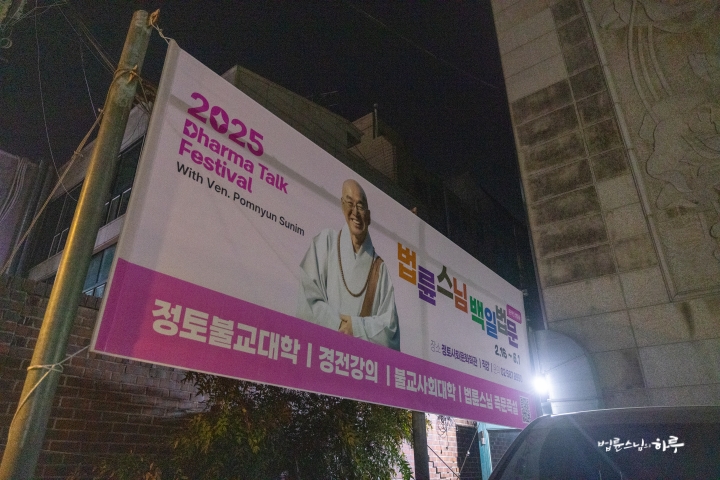
“That’s right. Your mother and father are living well even while fighting. They’ve already lived for 40 years fighting, so living another 20 years is no problem. So just listen lightly. Don’t keep trying to solve it. This problem can’t be solved, and there’s no need to solve it. Even while fighting like that, they educated you and got you married, right? So just think about that and be grateful. There’s no need for you to interfere in their fights.”
“I understand. Thank you.”
Tomorrow morning, Sunim will hold the opening ceremony for the 1st 1000-Day Practice of the 2nd 10,000-Day Practice and the 8th 100-Day Prayer. In the afternoon, he will conduct the opening ceremony for the 100-Day Dharma Talk and have a meeting with members of the Gwangju-Jeolla branch. In the evening, he will give a live Dharma Q&A lecture for students of the Jungto Sutra Course.





Listening to the Dharma talk reminded me that I have often overreacted to others’ complaints by trying to solve their problems or becoming involved too quickly in the past. I would like to be a better listener who be able to see into others’ minds.